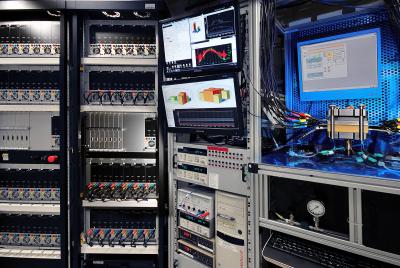Jan 17 2013
The transition from fossil fuels to sustainable and regenerative energy concepts is a challenge that sooner or later all industrial nations will be facing. Mastering this difficult task will require new technologies. Currently the green-energy industries in both Germany and Canada have a globally recognised leadership role.
 This shows the 50 channel system for characterization of fuel cells. Credit: Fraunhofer ISE
This shows the 50 channel system for characterization of fuel cells. Credit: Fraunhofer ISE
The new alliance between Fraunhofer and the The University of British Columbia UBC will contribute to maintaining and enhancing this role. On December 21st 2012 Fraunhofer and the Canadian university signed a framework agreement, giving the green light for a collaboration spanning several years.
"The cooperation with the UBC will support us in one of our key topics" states Prof. Reimund Neugebauer, President of the Fraunhofer-Gesellschaft. "Sources of energy in the 21st century will change, and this brings up many questions we have to solve. With the UBC we have found an excellent international partner for energy research". Project Leader Dr. Christopher Hebling, head of the division Energy Technology at the Fraunhofer Institute for Solar Energy Systems ISE, is excited: "Just like Fraunhofer, UBC recognizes the importance of environmental technologies for the future. Not only do both partners undertake excellent research in this field, but they also stand out due to their common strategy for cooperation with the industry. This alliance will strengthen and expand the leading position of the UBC and Fraunhofer in this market."
Fraunhofer Institutes for Environmental Safety and Energy Technology, UMSICHT in Oberhausen, and Machine Tools and Forming Technology, IWU in Chemnitz, complement the expertise of Fraunhofer ISE in the research collaboration with UBC. Direct research partner for Fraunhofer will be UBC's Clean Energy Research Centre, CERC. Total funding of 4 million euros has been secured within Fraunhofer and UBC to support this unique partnership.
It has been demonstrated that using the surplus electricity from wind or solar power plants to generate hydrogen is a possible option for energy storage. In recognition of hydrogen's increasing importantance as a universal and renewable energy source for the storage of electricity as well as for emission-free mobility, the partners will examine the development of innovative electrodes as well as electrolysis cells for PEM electrolysers. The goal is to enhance performance and level of efficiency. An additional subproject investigates the recycling of the used hydrogen in the production of solar cells. Fuel cells make it possible to reclaim the energy stored in the hydrogen. In the field of fuel cell research UBC and Fraunhofer ISE have already developed a globally unique method for spatially-resolved characterization of fuel cells. Processes in the cells can be monitored in detail, thus revealing the potential for optimisation. Building on this development the partners will continue their efforts to significantly improve the efficiency and reliability of fuel cells.
The collaboration will also investigate the efficient conversion of various, currently underutilized biomass materials. The investigation will concentrate on innovative cleaning methods to control and significantly reduce the tar content in the emerging product gas during gasification of wood and wood waste. The purified gas can then easily be supplied to combustion systems for a combined heat and energy generation. Wind is a significant component of the energy mix of the future. Therefore the partners will examine wind turbines from the viewpoint of production techniques. With the aid of innovative production technologies the opportunity to make the units more efficient will be explored.